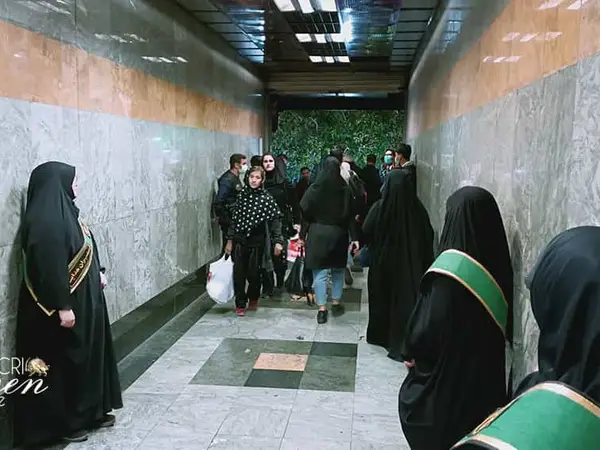Iran's interior minister denies having authorized hijab enforcers at the capital’s subway stations, claiming they are “citizens’ groups” carrying out a religious duty.
Photos emerged on social media on Saturday that showed black-veiled women forming a human tunnel, which many now refer to as ‘tunnel of horrors’, at one of Tehran’s main subway stations to make sure women wear proper hijab. Similar surveillance and enforcement have also been reported at other stations.
Since May, the capital’s subway stations have been the battleground of women who are against compulsory hijab and various hijab enforcers as well as some ordinary citizens who consider it their duty to force others to abide by the rules.
The women who wore green shoulder sashes with the words “guidance ambassadors” written on them stopped women who were not wearing headscarves to admonish them for breaking the compulsory hijab rules.
Responding to reporters’ questions on the topic after the weekly cabinet meeting on Wednesday, Interior Minister Ahmad Vahidi declared that citizens’ groups were only carrying out ‘amr-e be marouf' for which everyone is responsible.
The phrase refers to a pious Muslim’s duty to urge others to avoid forbidden deeds and carry out what conforms with religious rules.
“We have not issued any particular permits for [their work],” Vahidi who is second in command of the police force after Supreme Leader Ali Khamenei, claimed while insisting that that all citizens have a religious duty to carry out ‘amr-e be marouf’ but this can only involve “nicely worded” verbal exhortation.
“Interesting! So, this tunnel of horrors at the metro is a citizens’ [initiative]!” Mostafa Faghihi, the managing director of the moderate conservative Entekhab news website tweeted Wednesday in reaction to Vahidi’s claim.
“Do people also pay their monthly salary? Are they also hired and organized under citizens’ supervision? No authorization required? How democratic and free!” Faghihi wrote referring to reports in August that Tehran municipality was planning to hire 400 uniformed hijab enforcers to deploy at subway stations of the capital.
Speaking to Faraz Daily news website, an official of the Tehran Metro Company had also earlier denied that that hijab enforcers are officially active in Tehran subway. Hadi Zand, head of international affairs and communications of Tehran Metro Company, told Faraz Daily that the company only has uniformed security personnel who are responsible for dealing with various issues including peddlers and ensuring the security of the subway system.
Many, including prominent reformist commentator Abbas Abdi, have raised objections to the deployment of ‘Hijab Patrols’ in Tehran’s subway stations, the police force’s use of CCTV to identify hijab infringers and recording their images.
In a commentary written for the reformist Etemad newspaper Tuesday, Abdi warned the authorities that that measures such as creating hijab enforcers “tunnels” in the subway corridors would only deepen the gap between the people and the authorities and increases public anger and hatred.
He also argued that introducing hijab enforcers as “guidance ambassadors” is unjustified because governments in the modern world are not mandated to guide people and the police is only responsible for establishing order. Hijab enforcers are municipality employees or police who act based on the orders they receive and get paid for their work like other employees, he said.
